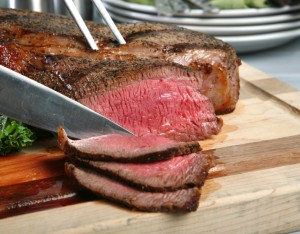A new study from Deakin University in Australia has found that women who eat government-recommended amounts of red meat were less likely to suffer anxiety and depression than those who did not. In fact, women who ate less than the recommended amount of red meat in the study were twice as likely to have depression or an anxiety disorder as those who ate the recommended daily amount.
 Professor Felice Jacka said, “We had originally thought that red meat might not be good for mental health, as studies from other countries had found red meat consumption to be associated with physical health risks, but it turns out that it actually may be quite important. ”
Professor Felice Jacka said, “We had originally thought that red meat might not be good for mental health, as studies from other countries had found red meat consumption to be associated with physical health risks, but it turns out that it actually may be quite important. ”
One of the studies the professor may be referring to is the Harvard study that found red meat consumption is linked to a higher death rate.
The study found that women who consumed less than the recommended amount of meat were twice as likely to suffer from depression or anxiety as those who did eat the recommended amount. Other factors, such as levels of physical activity, smoking, weight, and age did not affect the results.
The study found no such relationship between mental health and other protein sources, such as pork, chicken, fish, or plant-based proteins.
At the same time, eating more than the recommended amount, which is three to four 3 to 4-ounce servings per week, was related to increased depression and anxiety.
Professor Jacka said that the type of red meat consumed may be important. Grass fed beef and lamb has higher levels of omega-3 fatty acids that are key to good mental health. Beef from animals fed grain and kept in feedlots has less omega-3 fatty acids. Sheep and cattle in Australia are mostly grass-fed.
The Harvard study didn’t differentiate between grass-fed and corn-fed beef. Some studies have indicated that the nutritional profiles of those two products are quite different.
Food Poisoning Bulletin asked Shereen Jegtvig, editor of Nutrition at About.com about this study. She said the statement “‘twice as likely’ doesn’t mean anything unless you know what the baseline risk of depression is.”
We asked if these studies are meaningful to the consumer. She said, “Population studies like this at best can only pick out correlations, but not cause. Often, there is something else, some other lifestyle habit that’s going on. And it looks like they found those who ate the least red meat and those who ate the most had higher risks for depression. So the women in the middle have the least? That middle is apparently 3 to 4 servings per week. In this country, that’s not a lot.
Normally, red meat studies show red meat to be bad for everything, but those are probably overblown. And the heavy red meat eaters almost always smoke, drink more, eat fewer fruits and vegetables, get less fiber, and exercise less.”




